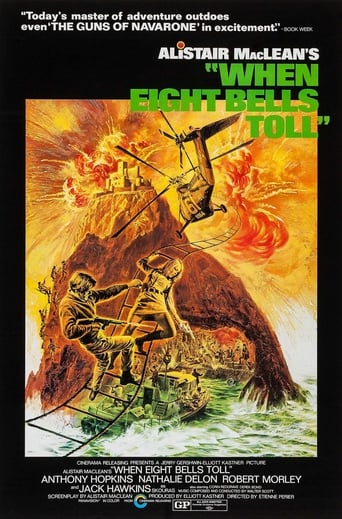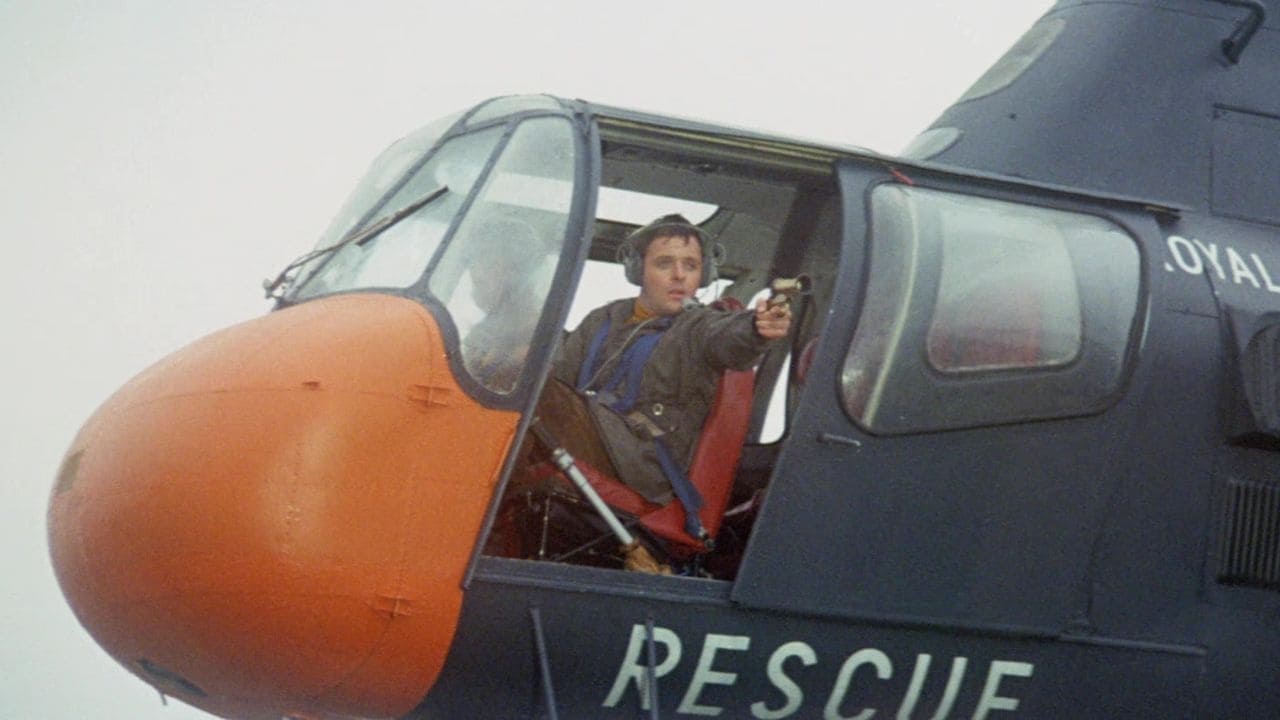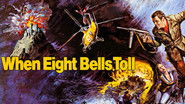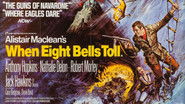OJT
Having trouble in engaging myself in the start of this movie, being a dramatization of the Alistair MacLean novel, it soon grew on me. The funny understatements back at the headquarters I immediately started loving.On the cover of this Norwegian edition DVD it's stated that MacLean has had18 of his novels made into films. I think this a successful adaption, though over shone by "The guns of Navarone" and "Where eagles dare". That said, it's a pity that his most exiting novel "Night without end" from 1959. Shurely it would be a great film to make even today.This is very like an 70'ies James Bond-film, where we meet Anthony Hopkins as an agent, not very unlike James Bond. There's even a Bond-girl. He is sent up to a rural part of coastal Scotland, MacLeans native country, to investigate why there are so many ships getting lost up there. He gets to find himself not very well welcome.I think Robert Morley is magnificent in his role as Uncle Arthur, and so is Anthony Hopkins as agent Philip Calvert, which have naturally bad manners, according to his boss, being born to a lesser class. Uncle Arthur's Lines are hilarious, and much wittier than his equals in James Bond-movies.Agent Calvert kills off bad guys like puppets on a chain (!), and the film keeps the mystery for a long time, making the ride an interesting one. This tells me Hopkins could have been a great Bond.The film is very time typical of early 70'ies, and it's a lovely coast and salty water film. You literary smell the salty sea water. It gets more entertaining and exciting as the film proceeds, and I think that it's a great period piece to watch.Recommended for those enjoying classics!
Coventry
Meet Alistair MacLean's Philip Calvert. He's the Scottish response to Ian Fleming's James Bond and particularly specializes in secret agent assignments at the Irish sea and off the Scottish East coast. Apart from their areas of expertise, Calvert and Bond have quite a few things in common. They're both reckless adventurers with an attitude problem and an aversion towards authority. They're both good with the ladies and don't mind randomly killing a handful of nameless bad guys. Calvert is send out to investigate the disappearances of entire vessels carrying gold bullion. It seems like there's a well-organized crime network active in area, run by an international shipping magnate and relentless enough to kill whoever tries to interfere. "When Eight Bells Toll" is a very decent and entertaining action/adventure movie, just don't expect the same dazzling tempo, ingenious gimmicks or impressive stunts as you would in an actual James Bond film. This is a totally unpretentious action flick with a strong lead performance from Anthony Hopkins (even though he doesn't really have the action hero allures) and various terrific choices of location. The film benefices from excellent photography, courtesy of Arthur Ibbetson, and several of the extended suspense sequences keep you literally on the edge of your seat, like for example the drowning helicopter and the finale inside a watery cave.
gbenskin
It seems that the whole world and their dogs know of Commander Bond, who takes his martinis shaken and not stirred, has his dalliances with the ladies, and manages to save the world before dawn.Agent Calvert (played most suitably by Anthony Hopkins) is how I believe Bond should have been. Both are Commanders of the British Navy I believe, both educated 'working class' and with both, you get a sense of being slight sociopaths. Don't get me wrong, I really am a fan of the Bond genre, but this performance by Hopkins seems gritty and more realistic a character and compares quite favourably to the Bond character played by other actors.There is some great dialogue between the upper middle class boss of Agent Calvert (Uncle Arthur played by Robert Morley) and Agent Calvert, which helps keep interest in the film between the action scenes. Compared to many of the scenes produced by action heroes of the last 10 years, some are a little dated, although there were still enough to keep me interested.Nathalie Delon was a great choice as the leading lady requiring rescue from the sea (were her intentions good or bad?), and its a pity that most outside of her native country did not see much more of her in other things.One of my personal favourite pieces of work by Anthony Hopkins.If you're an action fan, I still think this is worth a look. Long overdue a worthy remake I think.
FilmFlaneur
In 1971 Diamonds Are Forever was released, marking the end of Connery in the role of the world's favourite secret agent. A two-year hiatus would ensure before Roger Moore assumed the mantle, and to a mixed response from fans. In the meantime When Eight Bells Toll was released, scripted by Alistair MacLean from his own novel, and gave audiences a chance to see a different actor in a similarly adventurous role. Whether or not it was intended as an action 'calling card' for the young star (whose fourth film it was) Eight Bells certainly owes a lot of its inspiration to the 007 series, not least in that its hero Philip Calvert (Anthony Hopkins) is tough, naval officer, a "professional bastard," used to killing in the course of duty, working undercover against some widespread criminal combine. "Under conditions of extreme pressure" we are told, the surly Calvert is "unique". His adventures however, are less so. From Russia With Love (1963) is one visual influence: the helicopter which brings Calvert to his initial briefing drops him off before a building with a distinctive white façade which echoes Rosa Klebb's landing to inspect assassin Robert Shaw, while both films feature the shooting down of one of the same vehicles with a rifle. Elsewhere Calvert's white boat recalls that of Emilio Largo in Thunderball (1965), while the presence of large quantities of bullion at risk brings to mind the acquisitive obsession of Auric Goldfinger.Eight Bells even has its very own 'M' in the form of Robert Morley, whose crusty 'Uncle Arthur' is a cross between the part famously personified by Bernard Lee and rotund 'Mother' from British TV's The Avengers. The present film also features a memorable sub-Barry score by John Stott, who also worked on Peeping Tom (1960) as well as TV's Dallas and Dynasty. Stott's swaggering larger-than-life theme perfectly suits the matter in hand, and is one of the most striking elements in the opening sequence, the dramatic position of which reminds one of those standalone openings which head up so many Bond movies. That's not to say that When Eight Bells Toll is so derivative as to be un-enjoyable. Director Etienne Périer made this film, then Zeppelin (1971), in quick succession before disappearing back to France where he is still active, mainly in TV. This is the better of his two British productions: a brisk, no nonsense affair that benefits greatly from a strong cast and some excellent location work. It differs too in that, unlike most of the Bond series, its hero has no gimmicks to fall back on to save his skin. As Calvert punches and struggles against a range of adversaries, he does so without the benefit of the ejector seats and rocket belts which larger budgeted agents found so essential. Bond is a public schoolboy, who is by profession a lucky, sexually rapacious thug. Calvert has no such privileged background, and is viewed by his superior with some disdain as a "bloody fellow... north of England grammar school, working his way through life..." Of course the central irony of the film is that the main villain of the piece is exactly the sort of person that Uncle Arthur welcomes onto the wine committee of his club with open arms, while the insubordinate and independent Calvert proves an essential part of the operation's success.Calvert's closest friend - and the only genuine relationship he maintains during the film, is Hunslett (Corin Redgrave), a bespectacled intelligence man whose faces a somewhat predictable demise. There's an interesting tone to his early scenes with the hero and friend of over 10 years, as they share onboard accommodation. Codenamed 'Caroline' by London control, Hunslett and Calvert are almost like a married couple, making each other drinks or dressing wounds - a warmth of companionship in contrast to the suspiciously hostile relationship exhibited by Sir Anthony Skouras and his young wife Charlotte. The discovery of Hunslett's body, unexpectedly pulled up with the boat's anchor, provides one of the film's most striking moments, while his disappearance from the scene allows the reassuring display of Calvert's sexuality as he somewhat peremptorily beds Charlotte. Eight Bells hardly wastes a scene and apparently reflects the dramatic efficiency of the original book. The frequently adapted MacLean was on a roll at this time, having seen his work made into such successful projects as the early Guns Of Navarone (1961), then Ice Station Zebra and Where Eagles Dare (both 1968). The year before had come a near disaster with the problem-beset Puppet On A Chain (1970), but the present film makes a return to a standard of excitement that admirers of the novelist had come to expect. The film shows some sign of tightening up: once or twice Morley's scenes start rather abruptly as if dialogue has been excised, and some of the villainous minor characters are strangely silent throughout (it is odd, for instance, that such a fine supporting actor such as Peter Arne should appear without speaking). Jack Hawkins, struggling with the throat cancer that eventual killed him three years later, makes for a rather pasty-faced Greek millionaire, and Charles Grey may well have dubbed his lines. The only element of glamour in the film comes in the form of Nathalie Delon, who does a game enough job in a role that at one point requires her to take a dip in the freezing waters off Torbay. Her scenes with Hopkins are adequate, but this is a film that has little time for the sexual shenanigans of Bond, (in fact she has to directly proposition the hero while there is no bedroom scene) saving Charlotte's best scene for that at the very end of the film. The sexiest images in the film are stuck on the walls in the shark fisherman's hut, balefully eyed by Calvert, and even the eventual appearance of Charlotte in long white socks and shirt does little to raise the temperature. With some fine airborne photography as Calvert searches the Scottish coastline for ships as well as some effective settings in and around Torbay harbor, Eight Bells is a film which manages to be very atmospheric on what must have been a modest budget. The cold realism such an approach brings to the story helps it immensely. Hopkins turns in a fine performance as the single-minded Calvert, made even more resonant when one remembers the notoriously hard living the actor was famous for at the time. Those who have only seen Hopkins in later years as the most famous celluloid serial killer will be in interested in this unmannered early role.Among other highlights is Morley's fussily upper-crusted Uncle Arthur, whose eventual, grudging acceptance of his wayward officer is convincing - and he even makes a fair pass at waving a gun and defending the boat with a timely use of an open hatch. Seen today, the film remains very entertaining while the lack of self-parody and cynicism, common to contemporary action cinema is refreshing.


 AD
AD






